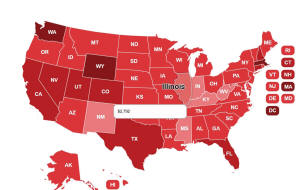|
Congress has until the end of the year to approve a new federal
tax reform package before taxes for individuals and businesses
go up on New Year's Day 2026.
Researcher Mattias Gugel said 80% of taxpayers in the U.S. will
face a tax increase if the legislation expires.
“We’re going to see an automatic tax hike for Americans if the
Trump tax cuts aren’t renewed by the end of this year,” Gugel
told The Center Square. “For families in Illinois, if the tax
cuts expire, the average Illinois taxpayer is going to owe
almost $2,800 more next year.”
The group said if the legislation expires, the federal standard
deduction would be cut in half, the federal child tax credit
would be reduced, and the estate tax threshold would be lowered.
The Tax Cuts and Jobs Act is considered a significant update to
individual and business taxes in the federal tax code. Illinois
U.S. Rep. Darin LaHood, R-Peoria, said the legislation has been
a boost for the economy.
“It is the most important and most impactful vote I have taken,”
said LaHood. “It created the best economy of my lifetime. Higher
wages, record employment, record number of investments in small
and medium-sized businesses. It created a booming economy.”
The report notes that Illinois tax code entanglement with the
federal tax code would cause a chain reaction of varying
outcomes. Twenty-four states automatically update their state
income tax laws to match any federal tax code changes to
definitions, calculations, or rules.
“If Springfield doesn’t act either, it is going to mean higher
taxes at the state level as well,” said Gugel.
Gugel points out that states could avoid this by “decoupling”
from changes to federal itemized deductions that result from a
lapse of TCJA and instead preserve current policy, or by relying
exclusively on a standard deduction.
All contents © copyright 2025 Associated Press. All rights
reserved |
|




